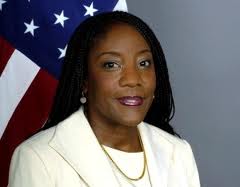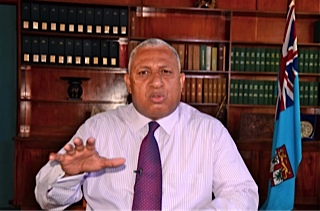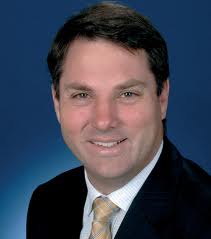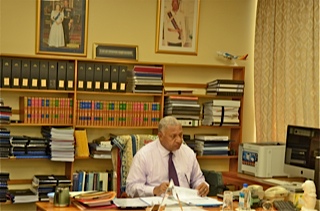 |
| Frank Bainimarama ( photo: Graham Davis ) |
 |
| Contact resumed : Frankie Reed ( Photo: US State Dept) |
In the case of New Zealand, Commodore Bainimarama said the renewed level of engagement was more modest. The travel bans on him and members of the regime remained but unlike Mr Rudd, the NZ foreign minister, Murray McCully, had been in contact with Fiji’s foreign minister, Ratu Inoke Kubuabola. “I think the Kiwis are more understanding than the Australians. I don’t really know why but there’s a large number of Fijians in NZ and I think they’ve put pressure on them to talk to us”. “I see representatives of some of the world’s biggest democracies – the Americans, the Indians, the Indonesians, the Japanese, the South Koreans and the French but not Australia. It doesn’t make sense”, he said.
While the Fijian leader declined to speculate on why American policy had changed beyond agreeing that an “about face” had taken place, concern has been expressed in Washington about Beijing’s ambitions in the region and especially its close ties with Fiji. Describing China as a “friend” which had given Fiji “about $200-million in soft loans”, Commodore Bainimarama said Australia only had itself to blame for the increasing Chinese presence in the region. “They are giving us support politically because everyone has withdrawn. They have recognised our sovereignty, which is very important for us”, Bainimarama said.
The Fijian leader said Mr Rudd had been noticeably absent from regional capitals during his 17 months in the foreign affairs portfolio. He had made only one foray into the region, a single weekend trip to Papua New Guinea last October. “We have never seen him around the smaller Pacific island nation states”, Bainimarama said. “He’s complained about everyone coming here but hasn’t come here himself.”
The Fijian leader contrasted Mr Rudd’s lack of interest with the recent visit to Fiji by Russia’s foreign minister, Sergey Lavrov, who made the first ever journey to the region by a senior Russian official. He said that unlike Australia, Russia appeared to recognised the growing importance of the smaller island states and wanted closer ties. “Maybe he (Lavrov) thinks everyone has backed off and this part of the world needs assistance”, he said. During his visit to Nadi at the beginning of the month, Mr Lavrov held talks with Commodore Bainimarama and other Pacific leaders who are members of a new voting bloc at the United Nations that Fiji has played a major role in forging – the eleven member Pacific Small Island Developing States ( PSIDS).
Graham Davis On Grubsheet
"Describing China as a “friend” which had given Fiji “about $200-million in soft loans”, Commodore Bainimarama said Australia only had itself to blame for the increasing Chinese presence in the region[...]
The Fijian leader contrasted Mr Rudd’s lack of interest with the recent visit to Fiji by Russia’s foreign minister, Sergey Lavrov, who made the first ever journey to the region by a senior Russian official. He said that unlike Australia, Russia appeared to recognised the growing importance of the smaller island states and wanted closer ties
[...]The Fijian leader accused Australia and NZ of driving a wedge through the Pacific by playing Polynesian countries off against their Melanesian neighbours. He described the Samoan leader, Tuilaepa Malielegao, as an “Aussie and Kiwi puppet” for his continuing attacks on Fiji."
The Fijian leader castigated Mr Rudd’s junior minister for the Pacific, Richard Marles, for having expressed concern that Russia was exploiting small states in the Pacific and was engaged in chequebook diplomacy. “He (Marles) is a hypocrite. He’s talking about chequebook diplomacy? Hasn’t he been giving money to the Pacific island nations in the last five or ten years?” Commodore Bainimarama denied that Mr Lavrov had offered Fiji and the other PSIDS countries financial assistance to recognise its puppet governments in South Ossetia and Abkhazia – territory also claimed by Georgia. “He gave Fiji a donation to help us with our flood appeal but that was it”.
Australia cut off ties with Fiji after Commodore Bainimarama’s 2006 coup and imposed a set of “smart sanctions” – including travel bans – in support of its demand for an immediate return to democracy. The Fijian leader has steadfastly refused to comply, insisting instead on a new constitution to remove racial inequality, followed by elections in 2014 based on one man one vote. Previous elections in Fiji have been weighted in favour of the indigenous majority.
As foreign minister, Mr Rudd resolutely ignored pleas to re-engage with Fiji, including from two influential foreign affairs think tanks, the Lowy Institute and the Australian Strategic Policy Institute (ASPI). Last year, the head of the Lowy Institute’s Melanesian program, Jenny Hayward-Jones, also accused Mr Rudd of neglecting the region and called for re-engagement to encourage Fiji to stick to its promise to restore democracy in 2014.
Commodore Bainimarama said Australian policy towards Fiji under Kevin Rudd was governed by “pride, not good policy”.“ He has personalised it, the way he called me a pariah and a dictator. He is a very ambitious politician and it’s been clear that he wanted to be prime minister again”. Describing Mr Rudd as the “main impediment” to better relations with Australia, Commodore Bainimarama said Canberra had continued to insist on an immediate election in Fiji even though it could never be truly democratic without fundamental reforms. “We are beginning work in a couple of weeks on a new constitution. We are not going to have elections tomorrow. We’re not going to have elections next year. We’re going to have elections when we’re ready and that will be before September 2014, as I’ve said all along”.
Commodore Bainimarama said his election as chairman of the Melanesian Spearhead Group after Australia succeeded in having Fiji suspended from the Pacific Islands Forum – the other major regional grouping -showed that Canberra was out of touch with sentiment in the region. The MSG encompasses 95 per cent of Pacific islanders, living in its member states of Papua New Guinea, Fiji, Solomon Islands and Vanuatu plus the Kanaks of New Caledonia. “Only Canberra and Wellington see me as an outcast”, Commodore Bainimarama said. “Nobody else does”.
The Fijian leader accused Australia and NZ of driving a wedge through the Pacific by playing Polynesian countries off against their Melanesian neighbours. He described the Samoan leader, Tuilaepa Malielegao, as an “Aussie and Kiwi puppet” for his continuing attacks on Fiji. Tuilaepa has accused Commodore Bainimarama of “lying” about his intention to return to democracy in 2014 and said he was “leading everyone down the cassava patch”.
The Fijian leader said he was not willing to trade insults with his Samoan counterpart but it was clear that he was doing the bidding of Australia and NZ. “It seems that every time he runs out of money, somebody winds him up and he plays to their tune. He goes “Fiji is no good, there’s a lot of problems in Fiji”. I don’t know why he spends a lot of time rubbishing Fiji but I have no time to be thinking about him”, he said.
Commodore Bainimarama said that while he “didn’t want to get involved in Australian domestic politics”,
Fiji’s best hope for a change in Australia’s attitude rested with Tony Abbott winning the next election. “I understand that Abbott is more understanding of the situation than Kevin Rudd and his team. And, yes, I would think there may be a change in policy.” Commodore Bainimarama agreed that Tony Abbott’s reputation as a sportsman and champion boxer meant that he was more likely to get on with him. “I would love him to bring about some change in policy, in the way we conduct our business. Yes, I will try to reach out to him if he wins. He’s welcome in Suva at any time”.
A shorter version of this article has appeared in News Limited papers in Australia, including Sydney’s Daily Telegraph.
Club Em Designs















